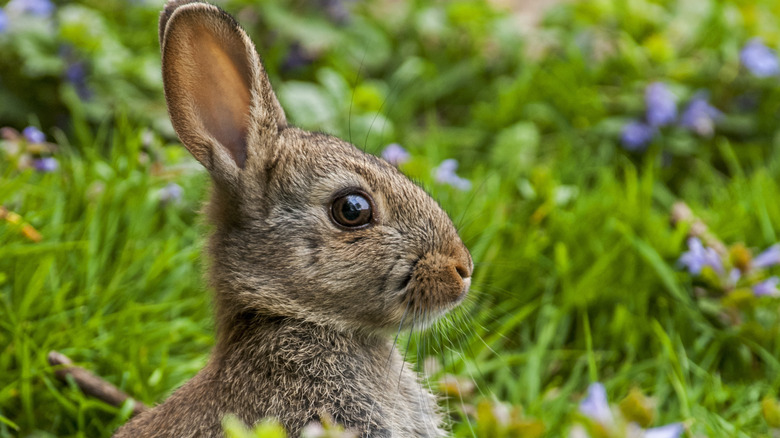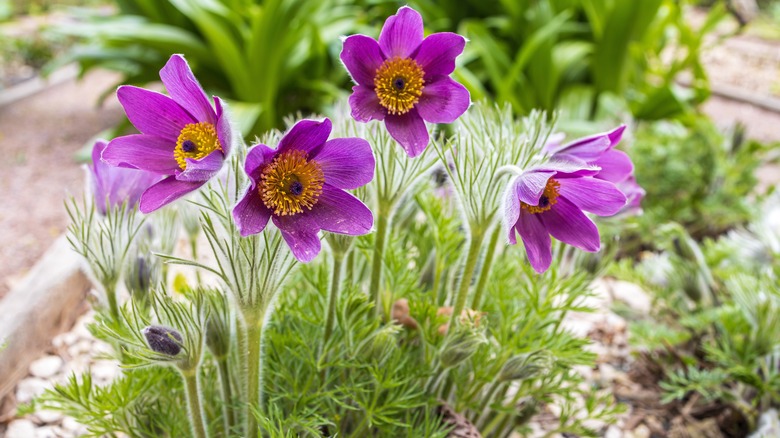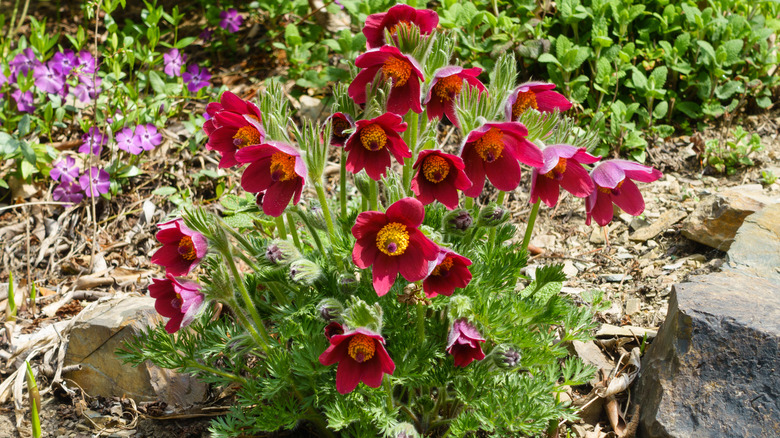Rabbits Won't Bother This Spring-Blooming Addition To Your Flower Garden
Just the thought of warm spring weather is enough to make any gardener feel giddy, but gardeners aren't the only ones who "come to life" in spring. Rabbits don't hibernate in winter, but they do tend to spend more time bundled up in underground nests or foraging for twigs and insects close to home. When spring comes around, these hungry bunnies are extra eager to get a bite of fresh greens, and your pretty garden might look like a tempting salad bar.
If you're struggling to keep rabbits out of your yard and away from your precious spring blooms, you may have tried to chase the rabbits away yourself or DIY your own liquid fence and banish rabbits naturally, but these adorable garden invaders can be persistent. For bunnies that just won't quit, you may need to think like Mother Nature and opt for garden plants that are naturally rabbit-resistant. One stunning spring-blooming flower you can add to your garden is the pasque flower (Pulsatilla vulgaris). This unique perennial has a large goblet shape that's eye-catching in any spring garden, but it isn't so appealing to hungry rabbits. Here's what you need to know about growing the pasque flower in your garden and why rabbits and humans agree that this is a plant best admired from a distance.
Pasque flowers pack a pretty punch
The pasque flower is a perennial plant that naturally grows in dry meadow regions of Europe. In the United States, it's hardy in USDA zones 4 through 8. The pasque flower is a type of anemone and a member of the Ranunculaceae family alongside buttercups and other "wind flowers." The name "pasque" originates from an old French term for Easter, the holiday around which pasque flowers typically bloom.
Why don't rabbits go for these pretty Easter-time blooms? Well, these flowers have thick, woody stalks and hundreds of fine, silvery hairs that cover almost every part of the plant, from the stalks to the leaves and even the outside of the flower petals. Rabbits usually avoid eating plants with this unappealing fuzz unless there's absolutely no other option. While all plants have the potential to be eaten by rabbits, Iowa State University lists pasque flowers as being seldom bothered by these pests.
Further, if bunnies do try to munch on your pasque flowers, they probably won't go in for a second bite. All parts of the fresh plant are poisonous to rabbits and humans, as they contain the toxin Protoanemonin. Consuming this flower can cause gastric upset, vomiting, and diarrhea. The plant's sap also causes skin irritation, blistering, and severe mouth pain. It might seem obvious, but this is one beautiful garden plant you'll want to stay far away from — or at least keep out of your mouth.
Growing pasque flowers for spring color
The pasque flower is relatively easy to grow to keep rabbits away. It prefers full sun with well-draining soil that is slightly alkaline. For the best results, plant new pasque flowers in your garden in spring or early summer or seeds in the fall. These flowers won't tolerate root disturbances, dividing, or transplanting very well. They can, however, spread through seed heads, so give them plenty of room to slowly reproduce if desired. Water one to two times per week until established and err on the side of underwatering, as overwatering can be detrimental. During a drought, the pasque flower plant may go dormant, but is usually one of the first blooms to return every spring. Be sure to wear gloves any time you touch the plant and wash your hands thoroughly after handling.
Pasque flowers are typically represented as having a bright purple color with rich yellow centers and pale silvery-green leaves, but the colors can vary widely between plants. Some cultivars can be lavender, white, pale blue, or even a dark red. Because this flower is an essential early spring perennial pollinators can't resist, it will attract bees and butterflies while simultaneously keeping rabbits at bay.


